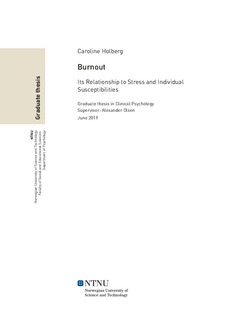Burnout - Its Relationship to Stress and Individual Susceptibilities
Master thesis
Permanent lenke
http://hdl.handle.net/11250/2612399Utgivelsesdato
2019Metadata
Vis full innførselSamlinger
- Institutt for psykologi [3103]
Sammendrag
Burnout is a clinical phenomenon characterized by the symptoms of emotional exhaustion, depersonalization towards work and clients, as well as diminished professional efficacy. It is considered a consequence of long-term work-related stress. Most research have revealed the influence of contextual factors in burnout, such as workload, time pressure, client contact, shift work etc. In addition, is has been recognized that individuals in helping professions in particular, are at risk for experiencing burnout. However, not everyone becomes burned out under similar conditions. If the size and type of external stressors are constant, then the variance in stress responses must be explained by individual differences in stress susceptibility. In the present thesis, the overarching aim was to review the etiology of burnout, with regard to its relationship to stress and individual susceptibilities. To this end, I searched the literature for relevant data sources. The data was categorized into meaningful components which allowed me to evaluate the major trends in the data set. Here, I found three major determinants in the stress response and the subsequent risk for burnout, that is, physiological differences in stress reactivity and differences in appraisal and coping. These determinants were found to be in large part dependent upon the individual´s interpretation of what is at stake, their bio-psycho-social resources (e.g., good health, problem-solving skills, emotional intelligence, self-esteem, social support) and how well these resources can be implemented in a sustainable manner over time. Resources that contribute to perceived control, meaning and mastery can protect against burnout.
